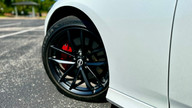Yes!
Whoops, you are not supposed to spill the beans that quickly into an article. However, that answer may be a bit controversial, so let me explain.

First, the styling. This thing looks AWESOME! Sadly, Internet commenters get lost in the big open grille up front, but not all cameras or screens capture the fact that, in person, it is not the big gaping hole that it appears to be online. There are two distinct sections of the front grille that only HDR cameras can truly capture. The upper part is a dark grey, while the lower part is blacked out. It could still use some visual distinction between the two, perhaps a body-colored bar across the front but otherwise, the look works (in person).
The rest of the Z is on point, on screen, or in person. The rear quarter angle has me turning around every time I park this thing just to get one last peek. Personally, I felt the rear of the 350Z and 370Z models to be bulbous, shapeless, and hideous. The back end of the 2023 Z is beautiful. Taking elements from the 300ZX of my youth, this is the best the rear of the Z has looked for decades.
The profile too is exceptional. The tapering roofline into that plunging rear end, the short rear overhang, the long hood… it all works.
Contrast that to the Toyota Supra that looks as though you gave a middle school student free reign to design a sports car. Don’t get me wrong, the Supra has some killer hips, an equally long hood to house its inline-6, and that ducktail spoiler is 🔥. However, the Supra seems over-styled. All the fake vents really take away from the beauty of simplicity that makes the Z elegant. The Supra too has a controversial nose. It is not my favorite view of that car either. It could use more of the Z’s big wide openings versus what I call the bird’s beak. Park these two side-by-side, and more will gravitate to the Supra, I am sure, but the simplistic athleticism of the Z still has me drooling.
Inside, the Z feels more spacious than the Supra. Where the Supra feels claustrophobic, the Z feels open and airy. (This is coming from someone who owned a 2012 Camaro). The numbers prove this out, with a few more cubic inches overall in interior volume of the Z vs. the Supra. The Z also allowed us to install Tucker’s child safety seat, using the seatbelt and the top tether location in the rear cargo area. The passenger-side airbag is weight-sensitive and remains off until there is enough weight in the seat.
The design theme of the inside gives a wide appearance, with the horizontal screen, three gauge pods over the infotainment, and the horizontally running blue accents under the black dash. Speaking of blue, this interior is BLUE! With leather and synthetic suede accents, there is a stark contrast to the pearl white paint and the black flooring and upper dash. Since blue is my favorite color, it did not phase me, but if you are opposed to blue, I would recommend the (dark) red or black options.
Now for the elephant in the room: performance. Looking at the specs and spending seat time in both, the Supra is clearly the better performer. I have tested the Supra on track, a privilege I am yet to claim with the Z, though given our time in this one I am curious how that would go.
The Supra is built in conjunction with BMW. Building low-volume sports cars is expensive, which is why 2 of the 3 “GR” branded sports cars from Toyota are actually made in partnership with other brands, which helps spread the R&D costs. (The other is the GR86 which is made with Subaru). Nissan, a company in a tough financial spot at the moment, went another way with the new Z. They took the old platform (which traces its roots back to the 350Z) and modified it for modern use. Its 3.0L twin-turbo V6 is a modified engine from the INFINITI Q60 Red Sport, while Toyota uses the BMW inline-six.
Power on the Nissan is rated at 400 horsepower and 350 lb.-ft of torque. The latter number seems a bit low as it really likes to slip that rear end out. I would suppose that the reason for the tail-happy nature of our Z is due to the Bridgestone Potenza tires which are not as good as the Michelin Pilot tires on Toyota’s performance vehicles. The traction control of the Z allows for just enough wheel slippage in the rear to put a smile on your face in traffic, but then cuts the power to reestablish traction on the drive wheels. I could see how an amateur like myself would have to get used to this behavior on a track if I were to turn off the traction control altogether.
Our tester had a 6-speed manual gearbox that was fine, but not a precision instrument by any means. My biggest gripe was confirmed by every friend I let sit in the driver’s seat and row through the gears: the lockout for reverse (which is to the far right and down) is physically pushing the shifter down towards the ground before finding “R”. The problem exists when trying to go from 4 to 5 in a rapid fashion. The area of the gate that leads to reverse is still available to slide the shifter into which could make you stutter shifting from fourth to fifth if you push the shifter too far right in the process. The shift pattern is the same as my daily driver of over a decade, so this was just an odd sensation for me that I am sure I would adapt to if I owned the Z.
When the Z first showed up, I was ready to send it back for all its shortcomings, but the longer I lived with it the more I came to respect it as the character of the vehicle. I can see now why so many presenters, journalists, and personalities of my youth would pick the quantifiably worse car as their favorite in comparison. The Z just had a personality that was too fun to ignore. The less grippy tires made errands fun with RWD and lots of power on tap and the gearbox only became a problem when driving fast, perhaps more so than one should in a commute.
Overall, I would describe the Supra as a scalpel and the Z as a machete. The aging platform of the Z is evident in both its character and interior materials. The Supra is definitely the one I would want to own as a weekend track star, but if I had to live with one of these two I would choose the Z every day and twice on Monday. It just had a better daily-driver feel to it with its more open cabin and less serious driving character. The Supra felt as though it took itself seriously, and it shows.
2023 Nissan Z Specs:
3.0L Twin Turbocharged V6 Engine
400 Horsepower (382 in the Supra)
350 lb-ft of Torque (368 in the Supra)
6-Speed Manual Transmission
Rear Wheel Drive
Carbon Fiber Composite Driveshaft
SynchroRev Match®
EXEDY® High-performance Clutch
Launch Control
1.5-way Mechanical Clutch-type Limited-slip Rear Differential
4.5 second 0-60 mph Acceleration (3.9 in the Supra)
155 mph Top Speed (155 in the Supra)
Aluminum Double-wishbone Front Suspension
Multilink Rear Suspension with Monotube Shocks
4 Piston Akebono® 14-inch Front Brakes
2 Piston 13.8-inch Rear Brakes
19-inch Black RAYS® Forged Alloy Wheels
255/40 R19 Bridgestone Potenza Front Tires
275/35 R19 Bridgestone Potenza Rear Tires
Dual Sport Exhaust
Seating for 2
Heated Seats
Blue Leather Seats with Synthetic Suede Inserts
Leather-wrapped Steering Wheel
51.4 Cubic Feet of Passenger Volume (50.9 in the Supra)
12.3-inch TFT Digital Gauge Cluster
9-inch Infotainment Screen with Wireless Apple CarPlay and Android Auto
8-speaker Bose Premium Sound System with Active Noise Cancellation
Automatic Climate Control
Heritage-inspired LED Headlights
Heritage-inspired LED Taillights
Rear Hatch
6.9 Cubic Feet of Storage Space (Supra 10.2)
Proximity Key with Push Button Start
EPA Fuel Economy 18/24/20 (city/hwy/cmb)
Starting Price: $40,990 (44,640 4cyl)
Price As Tested: $53,655 (59,250)
#GTGarageTalk #Nissan #Z #NissanZ #NissanZPerformance #ZPerformance #SportsCar #FuelEconomy #NewCar #CarReview #TXAutowriters







































































































Comments